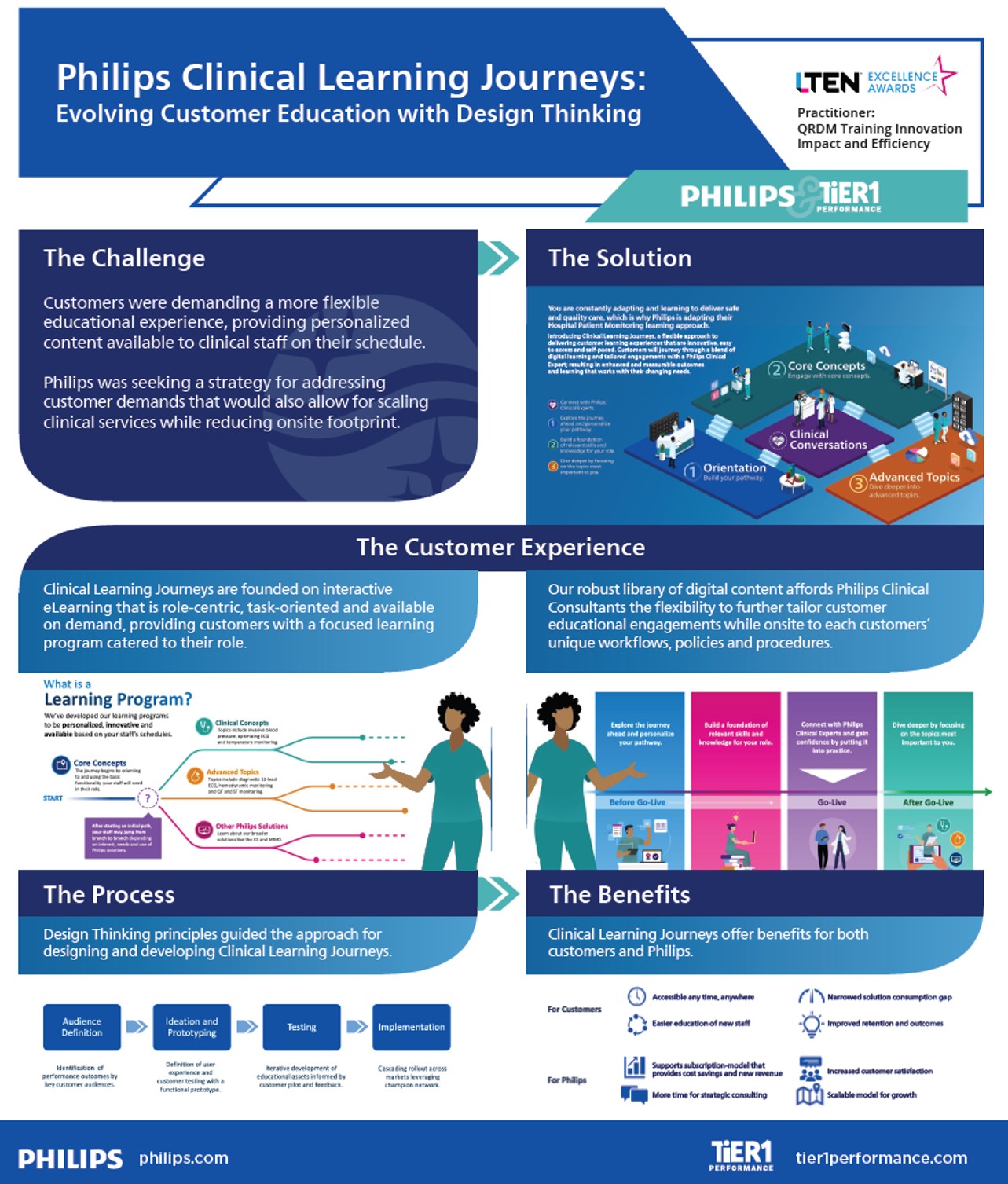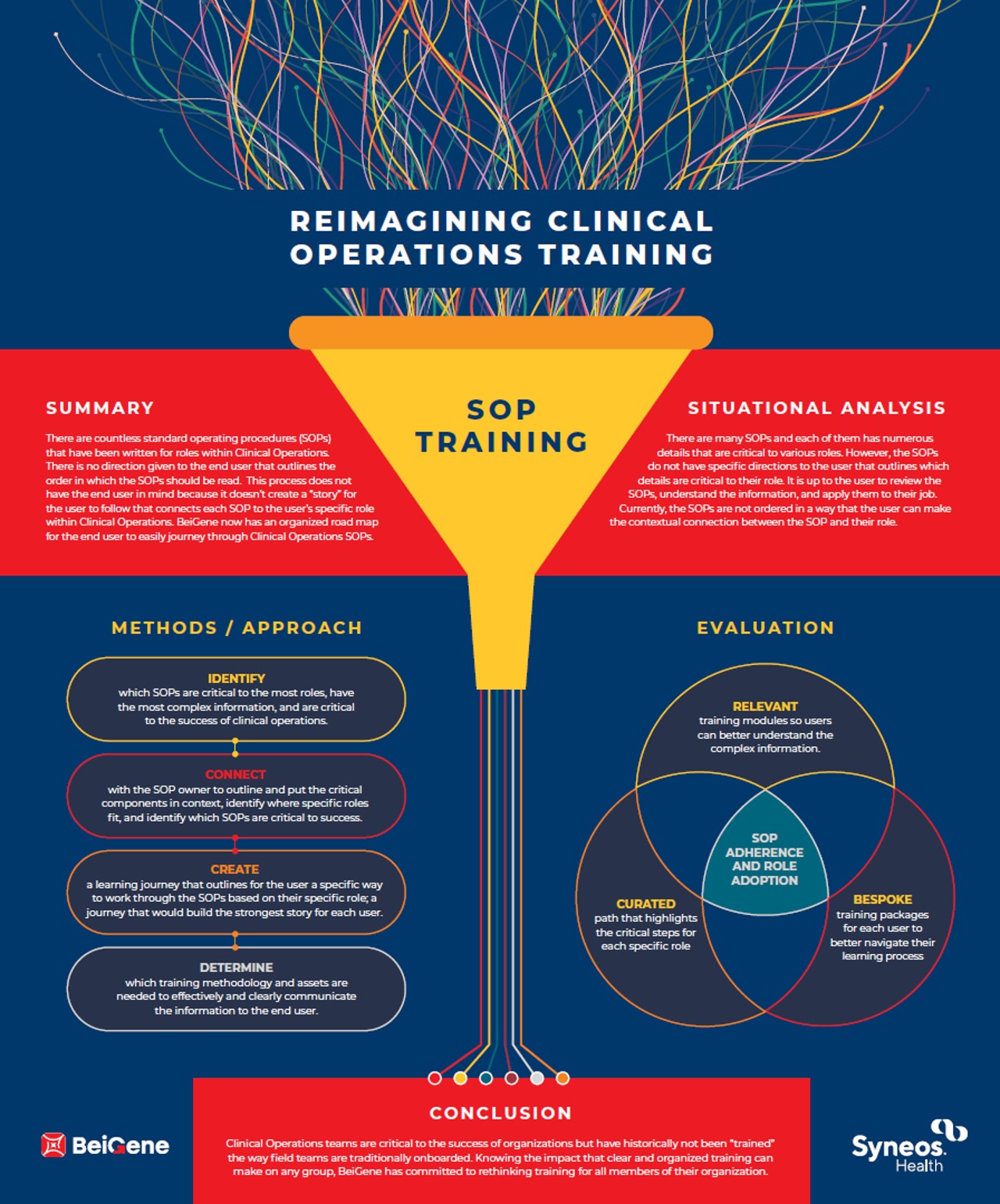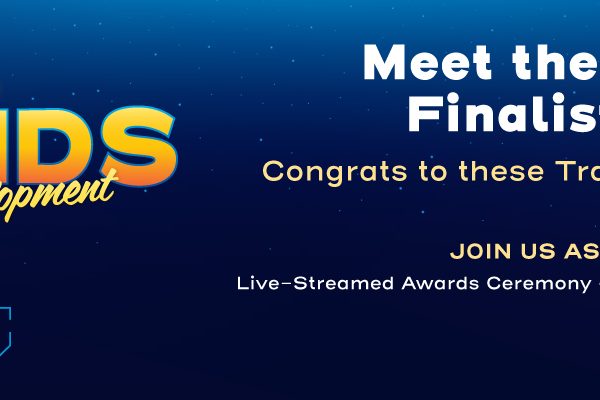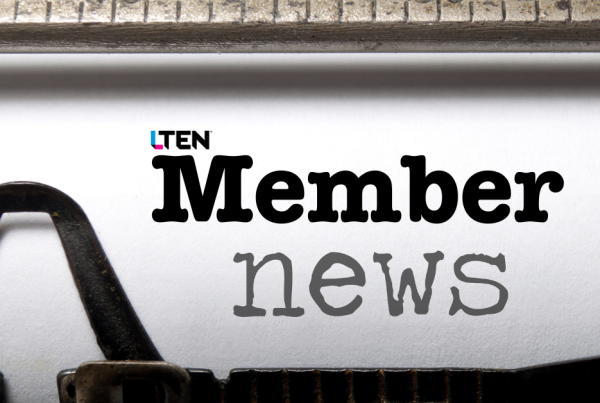Philips Healthcare has been recognized as a winner for the LTEN Excellence Awards in the Quality, Research, Development & Medical Training Innovation, Impact & Efficiency category. This esteemed recognition comes as a result of their transformative initiative in customer education through Clinical Learning Journeys, showcasing their commitment to innovation and efficiency in training practices.
The LTEN Excellence Awards is an annual awards competition that spotlights and recognizes innovative L&D initiatives, teams, leaders, and partnerships. Learn more about the awards competition here.
Read on to learn more about Philip Healthcare’s entry and meet the other finalists in this category, BeiGene and Genentech.
Philips Monitoring Clinical Learning Journeys
Evolving Customer Education through Clinical Learning Journeys
Philips Healthcare has been announced as the winner of the LTEN Excellence Awards in the Quality, Research, Development & Medical Training Innovation, Impact & Efficiency category, an accolade that highlights the company’s dedication to revolutionizing medical education.
The innovative aspect of the initiative lies in the adoption of a blended learning experience that exceeds regulatory requirements and provides flexible, personalized, and relevant education for clinical staff. The approach is centered around interactive eLearning, which is role-centric, task-oriented, and available on demand, allowing learners to track their progress toward competency. By incorporating digital content, Philips ensures that clinical experts have the flexibility to tailor customer educational engagements and offer more personalized consulting services grounded in the unique workflows, policies, and procedures of their customers.
The journey to this innovative solution began with a shift from product-focused to customer-focused education in Philips’ Hospital Patient Monitoring Clinical Service Delivery strategy. The company recognized the need to stay competitive, drive growth, and empower customers to optimize patient care through their monitoring solutions.
A comprehensive evaluation of existing educational services, both internal and external, led to the decision to move toward a blended model. This involved analyzing methods of delivery, instructional design best practices, learning outcomes, and associated costs. Collaborative design workshops, with inputs from key stakeholders, shaped the solution, resulting in a functional prototype of the eLearning concept. User testing was conducted to ensure the solution’s usefulness and acceptability, leading to minor adjustments in navigation and content presentation.
The learner’s best interests were at the forefront of the design process. Each module was aligned with clearly defined learning objectives, mapped to specific customer roles. Learning programs were created, grouping related modules to be recommended and assigned based on customer preferences and needs. The learner-centric design further included defined skills and benefits, authentic scenarios related to patient care, and flexibility for users to control their learning experience.
The impact of this transformative initiative has been remarkable. Customer engagements with the digital Clinical Learning Journeys have witnessed a 50% reduction in time spent on facilitator-led education, resulting in a 14% overall decrease in labor costs on those projects. Positive NPS responses further validate the effectiveness of the digital content. Moreover, the initiative has influenced Philips’ overall education strategy, prompting a holistic, customer-first approach that focuses on customer outcomes rather than product features.
The training project sought to improve customer proficiency in leveraging monitoring solutions and speed up proficiency, as identified through customer feedback and observations. The blended design of Clinical Learning Journeys enabled fundamental proficiency through on-demand digital content, allowing the clinical team to provide more contextualized coaching on advanced topics and workflow integration.
To evaluate the practice, Philips focuses on adoption, usage, customer experience, and productivity savings. Metrics track the implementation projects using digital education, digital education incorporation in the clinical field, and engagement data from the learning management system. NPS scores reflect customer experience and productivity savings are assessed through a decrease in time spent on education.
Integrating the change into the organizational culture came with challenges. To address confidence in leadership, key stakeholders were invited throughout the development journey. The inclusion of the clinical team in the content development process allowed them to take ownership of the solution. Change management workstreams and training equipped teams with the necessary tools for successful adoption.
Philips Healthcare’s Clinical Learning Journeys exemplify the company’s commitment to innovation, impact, and efficiency in medical training. This award-winning initiative has revolutionized customer education, offering personalized learning experiences that exceed regulatory standards while reducing labor costs and increasing customer satisfaction. Philips’ customer-first approach sets the stage for continued success and leadership in the healthcare industry.
Meet the Finalists
BeiGene — Setting Higher Standards for SOP Training
BeiGene, a global biopharmaceutical company, has been selected as a finalist for the LTEN Excellence Awards in the Quality, Research, Development & Medical Training Innovation, Impact & Efficiency category. The nomination recognizes BeiGene’s groundbreaking initiative that revolutionizes medical education within Clinical Operations.
The initiative centers around enhancing the onboarding experience for new employees by providing them with a more effective and engaging training program. Historically, Clinical Operations provided new employees with Standard Operating Procedures (SOPs) to integrate them into their roles. However, these SOPs were often disseminated through various platforms without a clear structure, leading to confusion and a lack of context for the learners.
BeiGene’s innovative approach involved the creation of supplemental training that accompanies existing SOPs, offering learners a clear and memorable understanding of how the SOP content relates to their specific roles. The training is designed to be relevant and applicable to daily functions, empowering learners to comprehend the global process and see how their contributions impact the overall success of the organization.
One of the key aspects of this initiative is its learner-centric design. BeiGene took deliberate steps to consider the best interests of the learners, the organization, partners, clients, and all stakeholders affected by the solution. The training group collaborated with various stakeholders to gain insights into the depth of knowledge required for different roles. From this information, appropriate assets were created, strategically balancing the necessary level of detail for each SOP. The team combined visual, auditory, and kinesthetic elements in the assets to enhance learner engagement and ensure the critical content remains memorable.
The driving force behind this initiative was the need to address several business challenges. BeiGene’s previous training practices centered primarily around compliance, resulting in approximately 100 to 150 Learning Management System (LMS) courses required within the first 30 days of employment. The lack of a chronological order for these courses left new employees overwhelmed and unsure about which courses were relevant to their roles. The need to organize the courses and provide context for each role’s SOPs was identified through a comprehensive needs assessment conducted by the head of global clinical operations learning and development in early 2021.
The impact of the implementation has been remarkable. In the short term, new employees experienced smoother onboarding, with frustration averted due to the clear SOP story presented through the training. Learners were engaged and empowered to be effective in their roles within the organization. In the long term, the initiative has led to increased proficiency among employees, empowering them to understand their roles better and their contributions to the organization’s success.
The evaluation strategy involves regular reviews of the SOP journey, SOP content, and role evolution. Feedback surveys are conducted to assess the effectiveness of the training and the learners’ readiness to perform their roles. By continuously reviewing and updating the content, BeiGene ensures the training remains relevant and impactful.
The initiative faced challenges, particularly in aligning the training team’s path with various SOP owners and managing their input on the training assets. However, effective change management and communication addressed these challenges, allowing the team to develop a successful and innovative training solution.
BeiGene’s innovative approach to medical training in Clinical Operations has earned them a spot as a finalist in the LTEN Excellence Awards. The initiative’s learner-centric design, addressing business challenges, and focus on long-term proficiency sets it apart as a pioneering and impactful program.
Genentech CMG Training & Development B85 Core Team — Training Center Transformation Focused on Innovation
Genentech has been selected as a finalist for the LTEN Excellence Awards in the Quality, Research, Development & Medical Training Innovation, Impact & Efficiency category. The nomination recognizes Genentech’s exceptional efforts in transforming their CMG Training & Development office space and establishing a new South San Francisco (SSF) training center in B85.
The initiative’s elevator pitch highlights the team’s dedication to innovation and excellence in designing a state-of-the-art modern training facility. Despite the challenges posed by the COVID-19 pandemic, the team’s future vision and meticulous planning resulted in a tranquil environment that fosters collaboration, innovation, and advancement of their business.
The innovative aspect of this initiative lies in the thoughtful consideration of the learners’ needs, the organization’s goals, and the impact on all stakeholders, including partners, clients, and the broader Genentech community. The training space was deliberately designed as a place for innovation and learning, where learners are empowered to build capabilities that maximize patient impact through various training formats, including virtual, hybrid, and in-person sessions.
The design decision for this practice was carefully reached through extensive research and collaboration. Genentech’s team researched world-class learning organizations, explored on-site building options, performed cost analyses, and decommissioned their existing learning center to create a right-sized learning space with cutting-edge technology. The team foresaw a future with hybrid training needs and ensured that the technical and digital services were designed to accommodate multiple access and delivery approaches for hosting and facilitating learning experiences.
The initiative’s impact on Genentech’s business and learner experiences is profound. With a dedicated SSF learning center, Genentech commits to fostering a thriving culture and employee development, aligning with their Pharma Vision. The Summit, an integral part of the new training center, has become a sought-after venue for onsite meetings and team engagements across the organization. The transformation led to millions of dollars in cost savings that can now be invested in R&D over the next decade.
To ensure proficiency and effectiveness, Genentech actively evaluates the initiative through a steering committee, advocate team, and ongoing surveys. They closely monitor facility and space utilization, number of events, onsite training offerings, and learner satisfaction and application of knowledge on the job. The data gathered is reported quarterly, enabling them to make necessary adjustments and ensure the initiative’s continued success.
Despite the challenges faced during the pandemic, Genentech’s team demonstrated resilience, adaptability, and commitment to creating a thoughtfully designed learning environment. The project required ongoing change management and open communication to align priorities and decision-makers successfully.
In conclusion, Genentech’s transformation initiative for their training and development space has earned them recognition as a finalist for the LTEN Excellence Awards. Their innovative approach, learner-centric design, and long-term impact on the organization’s culture and performance make them a deserving nominee. We applaud Genentech for their commitment to excellence and look forward to seeing the continued positive impact of their medical training innovation in the healthcare industry.
About the LTEN Excellence Awards
The LTEN Excellence Awards recognize the innovative and inspiring work done by life sciences training professionals at pharmaceutical, biotechnology, medical device and diagnostics companies (“practitioners”) and the strong support, innovation and creativity of training industry partner companies (“providers”).
Contact Us
For additional questions, please contact Awards@L-TEN.org.
Interested in sponsoring this year’s awards program? Contact Gregg Haunroth at ghaunroth@L-TEN.org









